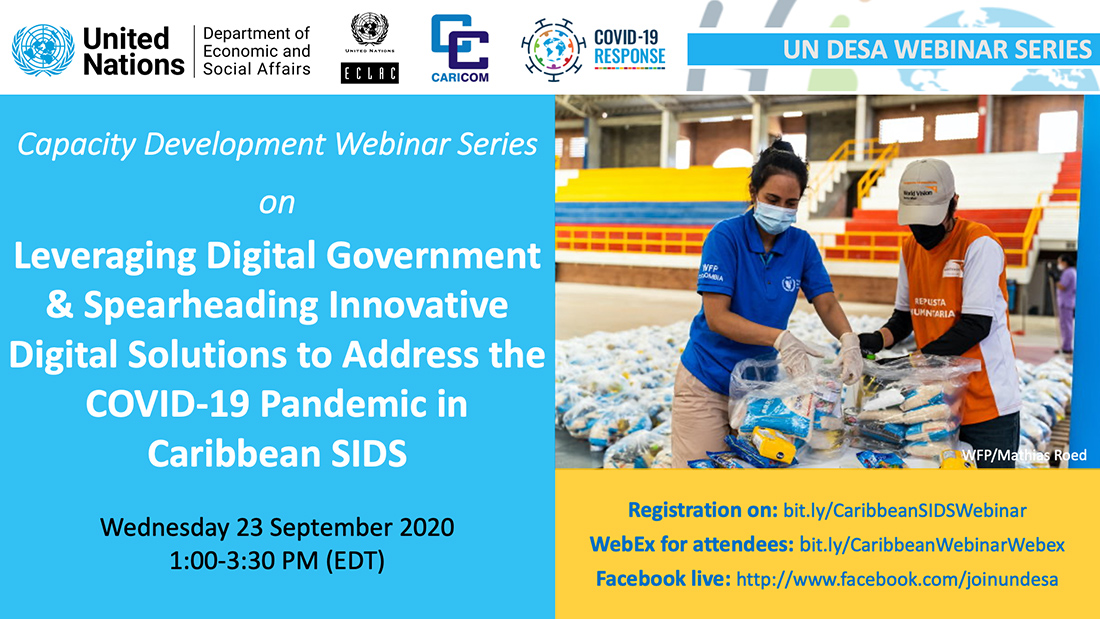The COVID-19 pandemic has exacerbated existing challenges confronting Small Island Developing States (SIDS) resulting in a new array of issues, which could potentially inhibit the implementation of the 2030 Agenda and the SAMOA Pathway. The pandemic calls for unprecedented action. It requires more than ever innovative and collaborative measures by all countries and the global community to contain the spread and mitigate its far-reaching repercussions.
Against this backdrop, the United Nations Department of Economic and Social Affairs (UN DESA), through its Division for Public Institutions and Digital Government (DPIDG), is organizing a Webinar Series on “Leveraging Public Governance & Spearheading Innovative Solutions to Address the COVID-19 Pandemic”.The Webinar Series addresses the needs of developing countries, including countries in Africa, Latin America and the Caribbean, the Middle East, and Asia and the Pacific.
This Webinar, which focuses on SIDS in the Caribbean subregion, is organized by UN DESA in collaboration with the UN Economic Commission for Latin America and the Caribbean (UN ECLAC) and the Caribbean Community (CARICOM) Secretariat with the support of the Caribbean Telecommunications Union (CTU). The webinar has also been designed to contribute to the ongoing discussions in the Caribbean Community (CARICOM) around, inter alia, digital government emanating from the 9th Special Emergency Meeting of CARICOM Heads of Government held on 15 April 2020 to agree on a way forward to the Community’s battle against the COVID-19 pandemic.
Objectives
Governments across the Caribbean have been severely impacted by the COVID-19 pandemic, due to their high economic dependence on travel and tourism, which have virtually collapsed as a result of border closures and restrictions. In the context of already high public debt levels and an even more limited fiscal space following the pandemic, Caribbean governments are endeavoring to strengthen public health interventions while limiting the impact of the crisis on financial and economic activities. Meanwhile, with an above-average forecast for the 2020 Atlantic Hurricane Season looming, Caribbean countries are extremely vulnerable to the adverse impacts of climate change, natural disasters and extreme weather events. The COVID-19 pandemic has created the perfect storm of overlapping health, climate and weather-related crises for many Caribbean SIDS.
Digital government presents vast opportunities for Caribbean SIDS and several Caribbean countries have digital transformation programmes underway. However, although new online tools have become available in the context of the pandemic, most government-to-individual transactions are still carried out in person. Furthermore, the pandemic has increased the digital divide for low income households, persons in remote and rural areas, and marginalized groups, such as persons with disabilities.
The subregion is strengthening its response to the COVID-19 pandemic through a “coordinated approach” to provide a resilient response to the next phase of the virus, including through leveraging digital government to increase access to public services and using technology partnerships to increase access to information and communication technologies (ICTs). Mitigating institutional disruptions while maintaining progress towards the SDGs and ensuring an effective response will require strong governance capacities, innovation, coherent policies, and a “robust digital architecture” to encourage digital transformation.
Building on new political will stimulated by the pandemic, Caribbean countries can also work with international and regional organizations to tackle common challenges to implementing digital technologies in support of the economic recovery of the region. CARICOM’s Single ICT Space Vision, Roadmap and Workplan and the 21st Century Government initiative of the Caribbean Telecommunications Union (CTU), offer opportunities for achieving resilient, effective systems of e-government and can also support technology partnerships to address infrastructure gaps and other challenges in the ICT sector.
The objective of the Webinar is to discuss challenges and share lessons learned in the Caribbean on how governments are addressing COVID-19 and what governance capacities are needed to confront the crisis. In particular, the Webinar will address the critical role of digital government in the Caribbean in the post COVID-19 era and how technology partnerships can be mobilized in the subregion in the fight against the pandemic.
Format
The Webinar will run for 2-1/2 hours. It will be conducted in English using video conferencing tools such as Cisco WebEx and Live Facebook.
The recordings will be posted on the website after the conclusion of the Webinar. The follow-up actions, including key recommendations and knowledge products, will be disseminated through the UN DESA, UN ECLAC and CARICOM websites.
Targeted Audience
The target audience of the Webinar Series includes government officials who are in charge of coordinating and leading the national efforts to fight the COVID-19, and government officials from the digital government and technology sectors, disaster management and health agencies, local government officials at the frontline, and fiscal and financial officers. The Webinar Series also intends to involve civil society organizations, the private sector, academia, health and quarantine experts, and regional/international organizations that are addressing digital transformation and the COVID-19 crisis in the region.
Expected Results
The Webinar Series aims to strengthen effective governance by enhancing integration, collaboration and cooperation among stakeholders through whole-of-government and whole-of-society approaches as well as national to local coordination to fight against COVID-19, with a focus on digital transformation. The Webinar Series will result in a) capacity development follow-up activities based on the expressed needs by Member States attending the webinars; b) possible digital solutions portfolio; c) a mechanism for intra- and inter-national collective learning and peer support; and d) information sharing through the UN DESA, UN ECLAC and CARICOM websites and other means.
Key questions on leveraging digital government and technology partnerships in the Caribbean to be addressed during the webinar
- How can digital government be prioritized in the CARICOM Single ICT space and leveraged to better address COVID-19 and other similar pandemics/disasters? What tools can be used and how?
- What are some of the (new) drivers in the region for digital service delivery?
- What mechanisms are being used to engage local entrepreneurs and start-ups?
- What policies would be required to stimulate local solutions, rather than dependency on big multinational solutions?
- How can local governments’ capacities for digital transformation be harnessed, including through the CTU’s 21st Century Government Initiative?
- What are some of the effective approaches or modalities for public-private partnerships in the area of digital technologies that you saw emerging prior to and during the COVID-19 outbreak?
How can technology partnerships best be used to support and enhance the efficiency, usage and resilience of government services in the Caribbean?



